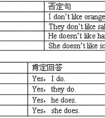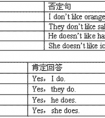短文改错。Hi, I'm Jack. I study at Beijing Sunshine Secondary School. I'm in Class 1, Grade 7. I am come from England . 1.I lives on Spring Road. I'm cl-七年级英语
题文
| 短文改错。 |
| Hi, I'm Jack. I study at Beijing Sunshine Secondary School. I'm in Class 1, Grade 7. I am come from England . 1. I lives on Spring Road. I'm clever at Maths. I have a cousin. 2. He is not very good at singing and dance. But he loves 3. listening to music. He has lots of CDs. He often listen 4. to them at the weekend. He also likes chatting with his friends. Would you like to make friends with he? 5. |
答案
| 1. 删除am或删除from 2. lives改为live 3. dance改为dancing 4. listen 改为listens 5. he 改为him |
据专家权威分析,试题“短文改错。Hi, I'm Jack. I study at Beijing Sunshine Second..”主要考查你对 实义动词,人称代词,实义动词的单数第三人称形式,系动词,动名词 等考点的理解。关于这些考点的“档案”如下:
实义动词人称代词实义动词的单数第三人称形式系动词动名词
考点名称:实义动词
- 实意动词:
即行为动词,表示动作的动词。实义动词与系动词是相对的,能独立用作谓语。
它分为及物动词和不及物动词两种:
及物动词是指后面要求有直接宾语的动词;
不及物动词指后面不需要跟宾语的动词。 实意动词使用方法:
及物动词
后面必须跟宾语意义才完整的实义动词,叫做及物动词(transitive verb)。如:
I believe that the committee will consider our suggestion.我相信委员会将会考虑我们的建议。
“How long can I keep the book ?”Harry asked.哈里问:“这本书我可以借多久?”
Dr. Bethune set us a good example. 白求恩大夫给我们树立了好榜样。
Crude oil contains many useful substances.原油含有许多有用的物质。
不及物动词
本身意义完整后面不须跟宾语的实义动词,叫做不及物动词(intransitive verb)。如:
Birds fly.鸟会飞。
It happened in June 1932.这件事发生于一九三二年六月。
My watch stopped.我的表停了。
She spoke at the meeting yesterday evening. 她在昨天晚上的会上发了言。
兼作及物动词和不及物动词
英语里有不少实义动词可以兼作及物动词和不及物动词。这样的动词又有两种不同的情况
a)兼作及物动词和不及物动词时,意义不变。试比较:
Shall I begin at once?我可以立刻开始吗?(begin作不及物动词)
She began working as a librarian after she left school.她毕业后当图书馆管理员。(began作及物动词)
When did they leave Chicago?他们是什么时候离开芝加哥的?(leave 作及物动词)
They left last week. 他们是上周离开的。(left 作不及物动词)
b)兼作及物动词和不及物动词时,有时意义不尽相同。如:
Wash your hands before meals.饭前要洗手。
Does this cloth wash well? 这布经得起洗吗?- 英汉实意动词用法比较:
与汉语的比较,有时英语动词的及物和不及物的用法,与汉语的用法不一样,请注意下列两种情况:
a)有的动词在英语里只能用作不及物动词,而汉语则可用作及物动词,如arrive到达,agree同意,listen听。英语里这些动词后面常接介词。如:
We arrived at the railway station at noon.
我们于中午到达火车站。(at不能省去)
(比较:We reached the railway station at noon.)
Everybody listened to the lecture with great interest.
每个人都很有兴趣地听讲课。(to不可省去)
(比较:We all heard the lecture.)
Do they agree to the plan?他们同意这个计划吗?(to不可省去)
b)有的动词在英语里能用作及物动词,而在汉语里则不能用作及物动词,如serve为…服务。
Our children are taught to serve the people wholeheartedly.
我们的儿童被教以全心全意为人民服务
用于be动词之后,实义动词之前。 实意动词的用法:
肯定句:
主语+动词过去式+其它
否定句:
主语+助动词didn‘t+动词原型+其他
一般过去式:
Did+主语+动词原型+其他
考点名称:人称代词
- 人称代词:
人称代词是用来表示人的代词,有单数和复数之分,有主格和宾格之分。人称代词的主格在句中作主语;人称代词的宾格在句中作宾语,也可作动词或介词的宾语。
主格:I, we, you, he, she, it, they在句子中作主语
宾格:me, us, you, him, her, it, them在句子中作宾语
He and I are in the same class. 我和他在同一个班级。
Can you see them in the street? 你能看见他们在街上吗? 人称代词在句中的作用:
1)主格作主语。如:
I am Chinese.我是中国人。
2)宾格作宾语,放在及物动词或介词之后,有时还可以在口语中用作表语。如:
①I don't know her.我不认识她。(动词宾语)
②What's wrong with it?它怎么了?(介词宾语)
③-Open the door,please.
3)作表语
作表语一般用主格, 但在口语中也常用宾格
I saw at once it was her.我一下子看到了她。
It's me.请开门,是我。(表语)
4)作同位语
作同位语是用宾格
We ,us ,there,will be able to fulfill the task.我们三人就能完成这项任务。- 主宾格的替换:
一、宾格代替主格
a.在简短对话中,当人称代词单独使用或在not后,多用宾语。
---- I like English. --我喜欢英语。
---- Me too. --我也喜欢。
---- Have more wine? --再来点酒喝吗?
---- Not me. --我可不要了。
b.在表示比较的非正式的文体中,常用宾格代替主格。但如果比较状语的谓语保留,则主语只能用主格。
- 最新内容
- 相关内容
- 网友推荐
- 图文推荐
| [家长教育] 孩子为什么会和父母感情疏离? (2019-07-14) |
| [教师分享] 给远方姐姐的一封信 (2018-11-07) |
| [教师分享] 伸缩门 (2018-11-07) |
| [教师分享] 回家乡 (2018-11-07) |
| [教师分享] 是风味也是人间 (2018-11-07) |
| [教师分享] 一句格言的启示 (2018-11-07) |
| [教师分享] 无规矩不成方圆 (2018-11-07) |
| [教师分享] 第十届全国教育名家论坛有感(二) (2018-11-07) |
| [教师分享] 贪玩的小狗 (2018-11-07) |
| [教师分享] 未命名文章 (2018-11-07) |


![How much does it ______ to fly from Yancheng to Hainan Island?[ ]A. cost B. payC. spend D. take-七年级英语](http://www.00-edu.com/d/file/ks/4/2/shiyidongci/2020-01-05/small7dcf2f05998de63e10cc3629787031c81578210087.png)

![He always _____TV in the evening. He _____ listening to the radio. [ ]A. watch, don't like B. watches, doesn't like C. watching, don't like D. watch, do-七年级英语](http://www.00-edu.com/d/file/ks/4/2/shiyidongci/2020-01-05/small45d599b4a60b84e61cec210bfbf051f51578214524.png)
![I'd rather ___ to the Mcdonald's Restaurant because I like to listen to quiet music.[ ]A. to go B. going C. go D. went-八年级英语](http://www.00-edu.com/d/file/ks/4/2/shiyidongci/2020-01-05/small1767bba1727fef2c035c53dcbd9bc20e1578209517.png)
